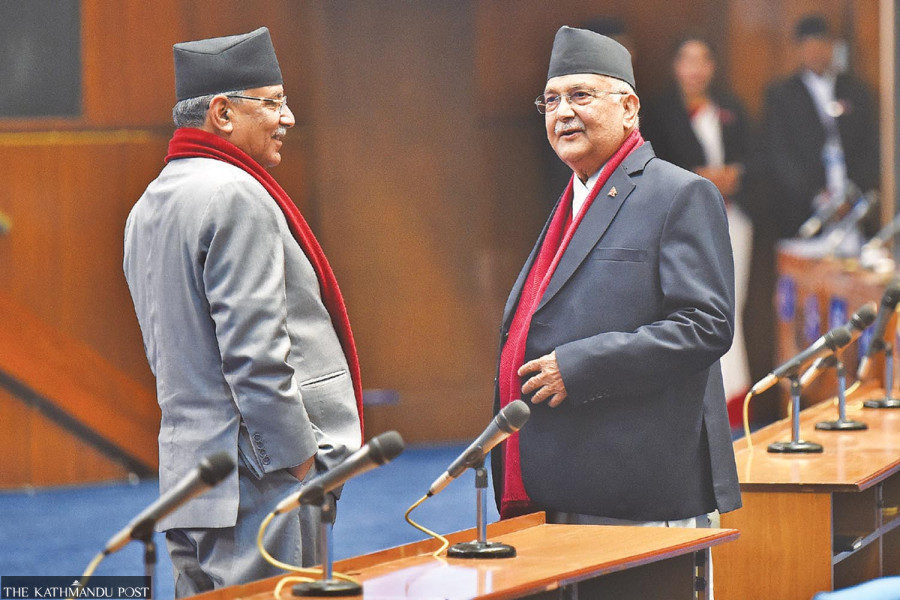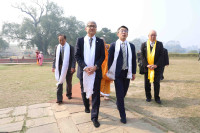National
China had no role in change of ruling coalition, UML chief Oli clarifies
Former foreign minister Mahat blames PM Dahal for the delay in BRI implementation.
Post Report
Amid speculations that Beijing is behind the recent change in coalition in Kathmandu, former prime minister and chairman of the CPN-UML KP Sharma Oli has said that it is not China but the political parties of Nepal that brought about the change.
Prime Minister Pushpa Kamal Dahal ditched his yearlong political partnership with the Nepali Congress last week and joined hands with the UML, the Rastriya Swatantra Party, the Janata Samajbadi and the CPN (Unified Socialist) to forge a new alliance.
Following the change in power equation, Kathmandu’s political and diplomatic circles have been busy speculating whether Beijing again encouraged the two big communist parties—the UML and the Maoist Centre—to come together.
But addressing the UML parliamentary party meeting on Tuesday, Oli clarified that it was not China that engineered the change in the government. “It’s us who changed the government,” said Oli. “The credit [for this change] goes to us, not anyone else.”
Some leaders from the main opposition Nepali Congress and other parties have been accusing Beijing of working hard to bring the leftist parties together. As a result, they say, Prime Minister Dahal was forced to change the alliance.
“The government was changed in Kathmandu under the influence of China and its ambitious Belt and Road Initiative,” CK Raut, chairman of the Janamat Party, said last Wednesday.
Raut added, “The ideological polarisation in Kathmandu has begun. The government change is linked with the power centre, whose interest is linked to the BRI. Fundamentally, the formation of the new government in Kathmandu is part of an ideological polarisation.”
Such an unnatural alliance will only invite more foreign power centres to the country, Raut went on, and further divide Nepali politics for and against democracy.
Some ruling and opposition party leaders, speaking on condition of anonymity, said that China always encourages unity among leftist parties in Nepal and was unhappy with the dissolution of the Nepal Communist Party in 2021. They added that this is not new.
In the past year, China invited senior UML and Maoist Centre leaders. Meanwhile, senior leaders from the Communist Party of China also came to Kathmandu in droves, with one senior CPC leader even expressing her frustration about different powers trying to sabotage Nepal-China ties.
But at the parliamentary party meeting on Tuesday, UML chair Oli ruled out any foreign hand in the recent change in coalition.
In the meeting, some lawmakers had inquired about the speculation that China is behind the recent government change.
“Why did you link China?” asked Oli. “I hear things like, China is behind the government change, the Chinese are coming in a big way, China has penetrated Nepal. We should not be talking like that.”
Oli added, “After a long and hard exercise, we formed a new alliance, so please give us the credit.”
Those familiar with the development said Oli took the initiative for government change with the main goal of breaking the Maoist Centre-Congress alliance.
But a UML lawmaker suspected that by ruling out China’s hand, Oli also wanted to take greater credit for engineering the new coalition.
“That is perhaps why he asked us to give him, rather than China, the credit for the change in coalition,” the lawmaker said.
The UML parliamentary party meeting also decided to give a vote of confidence to Prime Minister Dahal, who is going for a floor test on Wednesday.
Meanwhile, on Tuesday, the Nepali Congress Spokesperson Prakash Sharan Mahat, who recently exited the government after serving as foreign minister, said it was Prime Minister Pushpa Kamal Dahal who created a deadlock in implementing the BRI.
The two sides were expected to sign an agreement on the BRI implementation plan during Dahal’s official visit to China in September-end. The plan is vital for funding projects selected under the BRI. But due to a disagreement between the two sides, the plan could not be signed and the two sides are still working on a text.
The immediate past finance minister Mahat accused Prime Minister Dahal of being a major roadblock to the BRI’s implementation in Nepal.
“Prime Minister Dahal obstructed the signing of the BRI implementation plan,” Mahat told journalists at the Nepali Congress headquarters in Sanepa, Lalitpur on Tuesday.
“I was not the prime minister and I did not control everything,” Mahat said, responding to journalists’ queries about speculations that he had obstructed the plan. “It was him [the prime minister] who went to China on an official visit and returned without signing it. So why blame me?”
Mahat added, “Neither was I part of the prime minister’s delegation to China, nor did I pose any obstruction. Instead, I was the foreign minister in 2017 when we signed the BRI agreement and I have always supported the initiative.”




 9.12°C Kathmandu
9.12°C Kathmandu














